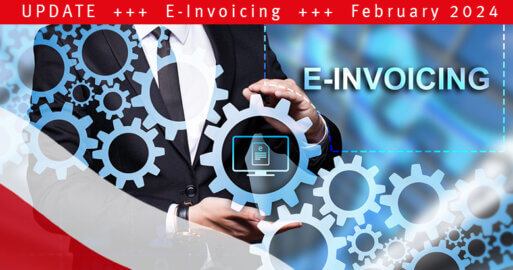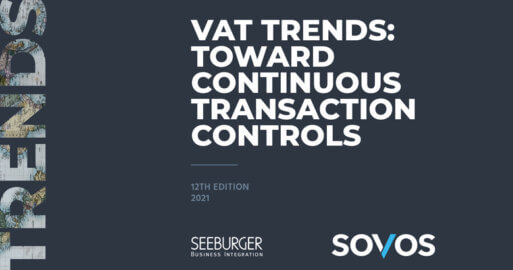CTCs in France: Update on French E-Invoicing and E-Reporting Mandate
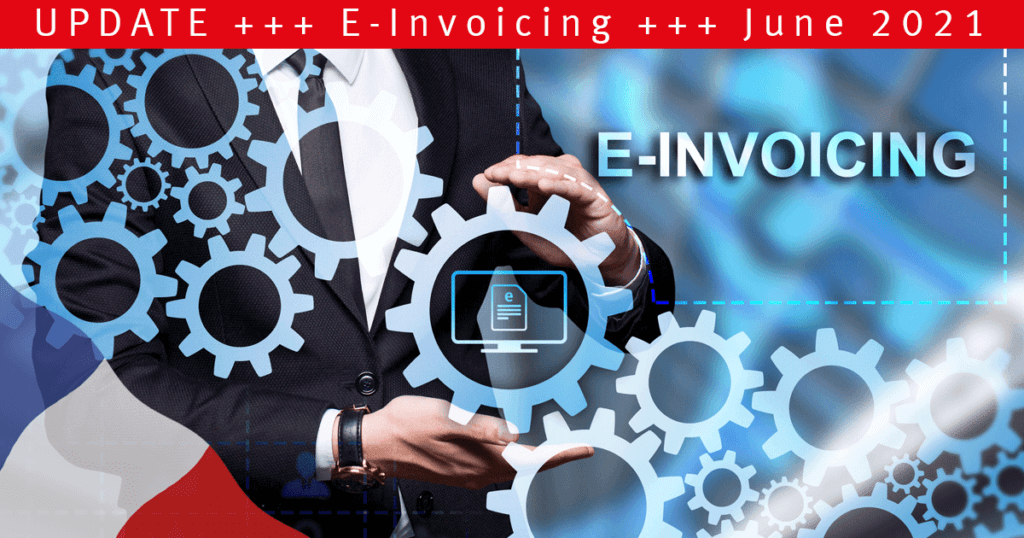
In September 2019, France published a plan to fully extend the current B2G e-invoicing mandate to B2B e-invoices by the beginning of 2025. The goal is to combat tax fraud and thus reduce the VAT gap. France is the second biggest economy in Europe with a considerable annual invoice volume. The impact of the upcoming mandate will hit thousands of businesses.
L’Agence pour l’Informatique Financière de l’Etat (AIFE, State Financial Information Agency) spent some time closely studying and assessing various international CTC models and countries’ experiences with them before deciding on their own approach. As directed by article 153 of the financial law “Loi de Finance 2020”, France is intending to implement a mechanism to report tax and invoice data in real time to the tax authorities, the Direction générale des Finances publiques” (DGFiP – Ministry of Economy and Finance).
Through its French subsidiary, SEEBURGER is currently actively participating in GT 153 workshops run by AIFE. We are advising on the following topics:
- Network / architecture / B2B addressing
- E-reporting to tax authorities
- E-invoicing business cases
- Invoice life cycle / status
The plans for the mandate for continuous transaction controls (CTCs) covering e-invoicing and e-reporting of B2B and B2C e-invoices and payment status are slowly starting to materialize. However, certain important aspects still need to be clarified.
What do we know so far?
What seems clear is that France has chosen a CTC model often compared to the Mexican clearance system. This CTC system is different from the CTC platform SdI in Italy. Instead of passing invoices through a central, national platform like the SdI, France is planning on using a combination of a next generation version of its national Chorus Pro platform and certified private platforms similar to the “Proveedores Autorizados de Certificación” (PAC) providers in Mexico.
This gives invoice issuers and recipients two routes to comply with the legislation. They can either connect directly to the national platform, or indirectly through a service provider. This makes it a more flexible system than centralized models in which the national clearance system passes an invoice to its recipient and which only accept one format.
Chorus Pro ‘next generation’ will be the national platform in charge of
- collecting e-invoices or a subset of invoice data for tax inspection purposes
- keeping a national register of trading parties from both private and public sectors
- sending invoices to providers or recipients as required
- collecting electronic reports from end points such as certified private platforms, or directly from invoice issuers and recipients
- providing basic services for electronic invoicing such as a web portal, converting pdf invoices to hybrid invoices, and status monitoring.
Certified private platforms will be responsible for
- extracting relevant data from e-invoices as specified by the tax administration
- conducting the same tax controls as the national platform
- sending invoice data to the national platform in a permitted formats
- sending invoices on to other certified private platforms once all checks have been successfully passed. This condition is extremely important in order to avoid conflicts between issued and reported invoices.
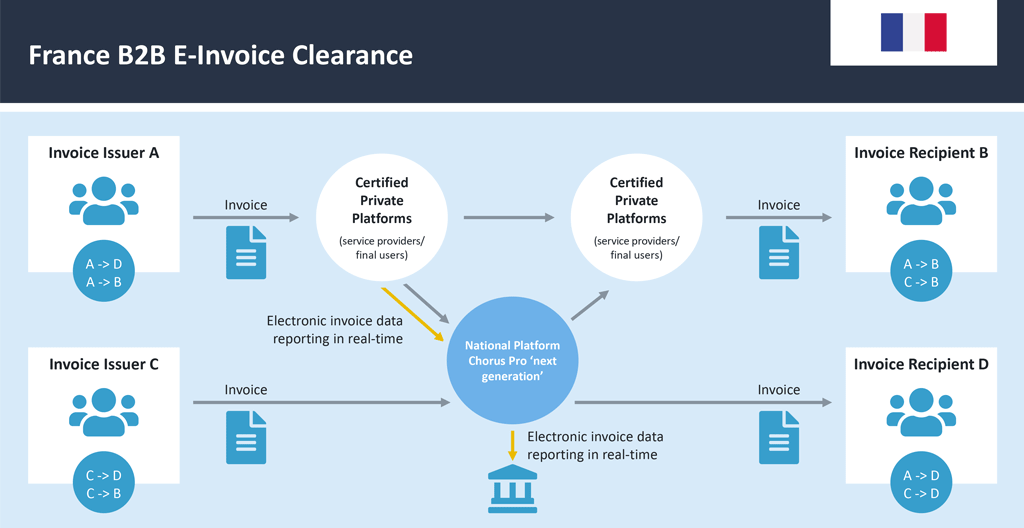
What will this mean for you?
For French companies, the CTC mandate will require them to:
- send a set of invoice data – or the invoice itself – to a national platform, Chorus Pro ‛next generation’, for clearance processing by the tax administration.
- send additional tax reports in a defined e-format and in real time for any Business-to-Consumer invoices, cross-border invoices, remittance advice or further information on payment status.
- receive electronic invoices in a few defined electronic formats.
In the discussions on the CTC model and how it was to be rolled out, a lot of attention was paid to the needs of the companies who will ultimately be using it. It was important to ensure that companies would be able to continue using the technology and services in which they had already invested. It was also important that the pace of the roll out suited businesses and served their culture and needs, too.
You will be able to continue to use current invoice formats, existing integrations with business partner and existing archiving solutions if:
- The information required by the French tax authorities can be reliably extracted and electronically reported in a specified format.
- Compliance checks – to be specified in future legislation – are performed on the invoice data.
- Data can be reliably extracted and electronically reported by certified private platforms, who will also conduct compliance checks. (service providers or internal solutions).
It seems that a certified private platform could be either an external service provider or an internal solution. However, how to gain this certification, what exactly will be certified by whom, and the timeline for the solutions to be certified by the end of 2022 have not yet been specified.
When does my organisation need to be ready for these changes?
When the Chorus Pro platform was introduced for mandatory electronic Business-to-Government (B2G) e-invoicing , this was done in annual stages. The year it became mandatory for a company to issue e-invoices depended on its size. This approach proved so successful that it is going to be used for rolling out the new mandate, starting with large companies in 2023:
- 1st January 2023: All large companies must send e-invoices and e-reports.
- 1st January 2024: All medium-sized companies must send e-invoices and e-reports
- 1st January 2025: All SMEs (all remaining businesses) must send e-invoices and e-reports.
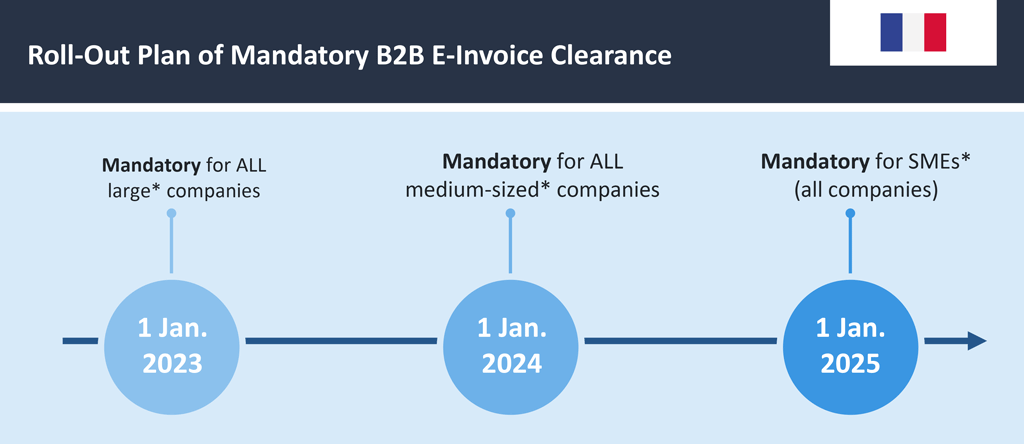
The definition of a large, medium-sized or remaining SME company is not yet clear. It is, however, already clear that pdf invoices which do not contain structured invoice data will no longer be permitted.
Companies must be able to receive e-invoices from 1st January 2023
It is important to highlight that all companies will be required to accept electronic invoices by 1st January 2023 – regardless of their size. However, the exact format – or more likely, formats – companies must be able to accept has not yet been specified.
Will the invoice format/s include a visual representation? Or will receivers need to visualize and generate human-readable invoice copies at their own expense? For the majority of small and medium-sized businesses, such questions are important, especially when considering how to implement e-invoicing and the costs involved. That is one of the reasons why a hybrid invoice format such as Factur-X (aka ZUGFeRD in Germany) is very likely to be among the limited number of formats which recipients will be required to accept. Other standards which we suspect may play a role in the CTC mandate include the UBL 2.1 syntax used for B2G e-invoicing with the current Chorus Pro platform in France, as well as the European Invoice Standard EN 16931 and the Core Invoice Usage Specification (CIUS) Peppol BIS Billing 3.0.
How can SEEBURGER help you comply with the new French mandate?
We are an experienced provider of e-invoicing cloud services, offering a single-source solution to enable you to comply with global and specific local legislation, both within Europe and further afield. With strong local support from SEEBURGER’s office in Paris, we serve our multinational clients and our French national clients with various GS1 certified French e-invoicing services including ensuring DEMAT “EDI complet – B2B” conformity, and offering Factur-X B2B and B2G e-invoicing services through the Chorus Pro platform. SEEBURGER Global E-Invoicing Services integrates with SAP’s eDocument Cockpit on SAP ECC and on S/4HANA, or with any other ERP system.
Read our Update on CTCs in France.
Webcast on-demand
Learn more about e-invoicing requirements and watch our webcast on-demand!
Thank you for your message
We appreciate your interest in SEEBURGER
Get in contact with us:
Please enter details about your project in the message section so we can direct your inquiry to the right consultant.
Written by: Gerrit Onken
Gerrit Onken has been at SEEBURGER since 2010 as a product manager for software applications and for electronic data exchange services for the business sector. He focuses on solutions for SAP, electronic invoicing (e-invoicing) and innovations for digitalizing business and technical processes for globally-active customers. Originally a banker, Gerrit Onken went on to graduate in business administration, majoring in industrial management and business informatics. After working in the financial sector, he worked as a manager and project manager from 2004 to 2010 for one of the top five corporate consultancies, working with international BPOs in the banking and automotive industries.
